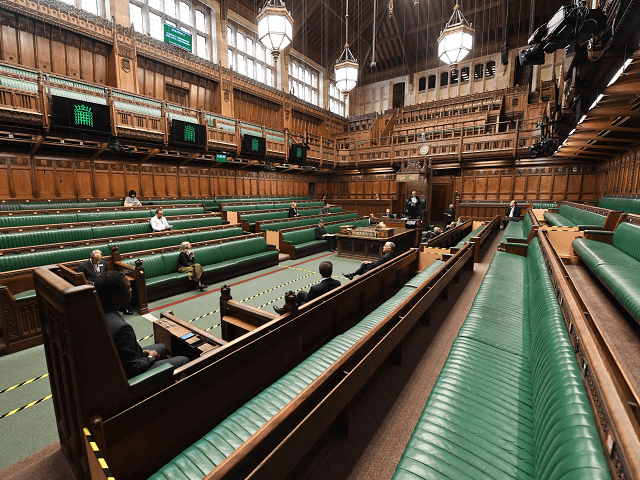Remote voting, a long-standing pet project of left-wing reformers who oppose parliament’s traditions and ways as inconvenient and anachronistic, has been nodded through in response to the hybrid ‘digital chamber’ ushered in by coronavirus concerns.
Members of Parliament will be able to vote on legislation without having to physically present themselves for counting — a long-standing feature retained to prevent vote fraud — for the first time next week, as house authorities have approved computer software in response to the coronavirus.
Under the new system, The Times, reports, members will log in through two-factor verification — a feature typically seen on social media platforms to add another level of security to the login process — to access the system, and will be able to select ‘Aye’ or ‘No’ during votes. Divisions will last 15 minutes and once members have voted they will be texted with a confirmation of their decision, the report notes, presumably as another form of security and verification.
The voting by divisions — entering a special room labelled either Aye or No during a vote to be counted — is one of many traditions of Britain’s parliament that may, upon first inspection, seem strange or even pointless, but nevertheless are threads in a rich tapestry that make the Commons one of the world’s most effective and longstanding parliaments. The modern fashion for new parliaments — as seen in Germany’s Bundestag, the European Union’s Parliament, and even the Scottish Parliament, is for a horse-shoe shaped chamber, with members having their own desks, voting computers, and seats.
The sheer size of the European Parliament, for instance, makes contributing to the debate unless the chairman has turned on your personal microphone quite difficult. It also allows for abuses of power, as seen on the very last day of Britain’s formal membership of the bloc when Brexit Party leader Nigel Farage’s valedictory speech was cut-off mid-flow.
In London, by contrast, Parliament is arranged with two sets of opposing benches, deliberately made with fewer seats than members, giving the chamber an intense feeling of occasion on important days, as many members are forced to stand, or even sit on the floor. Some of this has already been lost in the new quasi-digital chamber. Speaking to Breitbart London last month, speaker of the Tynwald Parliament — the oldest in the world, based on the Isle of Man — noted the digital system where members are muted unless invited to speak was a radical change. He said: “…it is a real tangible problem.
“It is an important ability of politicians to ‘read the room’, which is impossible in a virtual chamber where you can’t see the body language… It’s certainly going to be hard for a new Opposition leader to make an effective mark when it will be harder for the public to know if he is really landing blows at PMQs.”
Eroding the traditions of the Commons has long been on the to-do list of activists who claim the chamber is “antiquated” and “anachronistic”. A 2011 article by the hard-left Green party leader Caroline Lucas outlined a blueprint for these reforms, with the first item on the list being an electronic voting system to replace the 400-year-old traditional system, which the climate change alarmist dismissed as “bizarre and time-consuming”.
While Parliament’s authorities — led by arch-conservative Jacob Rees-Mogg — have assured the historic switch to digital voting would be time-limited and temporary, reformers can become spectacularly conservative themselves when their own narrow objectives are achieved. As Nigel Farage has warned about other changes to the British way of life under the name of coronavirus protection, seductive arguments will be made by those people it benefits to not give Britain back its traditions and liberties just because the coronavirus emergency has passed.
Across the Western world, the coronavirus lockdown — having wrought some of the greatest and most sudden changes to the way of life of most ordinary people in modern times — is being weaponised as a means to achieve lasting change for left-wing activists. A world without air travel, where car journeys and new car sales are at their lowest levels since the end of the Second World War, and where consumer culture has been all but cancelled, remain the key objectives of green activists, and some have even reflected positively on the coronavirus pandemic as an example of how the world could be, if only the human race would turn the economy off.
Breitbart News has reported on similar developments in the United States, where a coalition of progressive campaign groups has leapt upon coronavirus to tick off a left-wing shopping list of desires to fundamentally transform American society by achieving longtime progressive aims. Breitbart reported:
In the spirit of the repurposed progressive anthem of never letting a crisis go to waste, the suddenly created People’s Bailout group is demanding that the next stimulus package adhere to “five principles” the group says are endorsed by “nearly 1,000 organizations, unions, and community leaders, and nearly 100 members of Congress.”
Those “principals” encompass such far-left wish list items as government healthcare for illegal immigrants, required $15 per hour minimum wage, enhanced union collective bargaining and government regulation of the board of directors of private companies to ensure “worker representation.”
The establishment of digital voting for Britain’s parliament follows the first so-called hybrid sitting of the house, launched in April and again in answer to the government’s social distancing rules introduced for coronavirus. The system allows 170 of the 650 members to be involved with any given debate, with 50 physically present but strictly segregated in the chamber, and a further 120 participating remotely through video conferencing software Zoom.

COMMENTS
Please let us know if you're having issues with commenting.